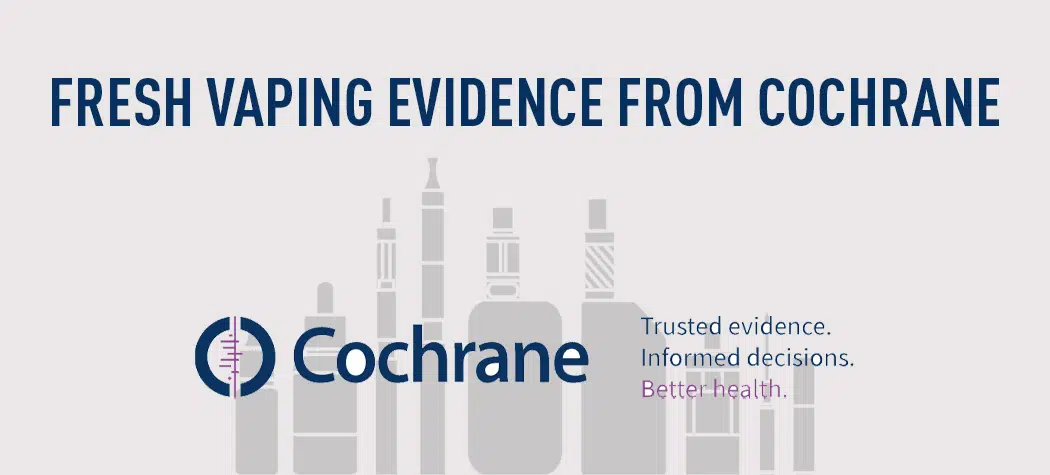Industry Research, Health Studies
Fresh Vaping Evidence From Cochrane
Fresh Vaping Evidence supporting the use of electronic cigarettes has been released by the widely respected Cochrane Tobacco Addiction Group (Cochrane TAG). The work by Cochrane is truly independent, conducted by academics at British universities, and funded by Cancer Research UK.
The team at Cochrane TAG produce rolling evidence updates, called a living systematic review, where they factor the findings from the latest electronic cigarette research into what we already know.
The Global State of Tobacco Harm Reduction says: “CochraneTAG for healthcare and policy professionals…reports that findings consistently favour e-cigarettes for smoking cessation at 6 months or longer, with nicotine vapes compared to non-nicotine vapes, NRT, behavioural support only or no support.”
How trustworthy is the evidence produced by Cochrane TAG?
It is common to see the Cochrane TAG reviews referred to as a “benchmark” for evidence-based policymaking within healthcare. Its independence is guaranteed, its findings beyond question.
The team includes well-respected experts such as University of Oxford’s Professor Jamie Hartmann-Boyce, University of East Anglia’s Professor Caitlin Notley, and Queen Mary University’s Professor Peter Hajek.
What does Cochrane TAG do to produce its evidence update?
In its latest work, Cochrane TAG looked at 61 pieces of research that covered 16,759 adults from 14 countries on five continents.
The team looks for evidence finding for and against the effectiveness and safety of switching from smoking to vaping e-cigarettes as a means to achieving permanent abstinence from tobacco products.
They compare the use of electronic cigarettes with the use of NRT (nicotine sprays, patches, gum), varenicline, nicotine‐free e-cigs, counselling, and people going cold turkey.
What Vaping Evidence did Cochrane TAG find?
- Evidence from four studies shows people switching to vaping are more likely to stop smoking than by using traditional nicotine replacement products
- Evidence from five studies shows people switching to vaping are more likely to stop smoking than by using nicotine‐free e‐cigarettes
- Evidence from six studies shows people switching to vaping are more likely to stop smoking than by using counselling/behavioural support alone
- 14% of people successfully quit using a nicotine-containing e-liquid. This compared favourably to just 6% successfully quitting with NRT products, 7% using nicotine‐free e‐cigarettes, and 4% relying on just counselling/behavioural support alone
Importantly, they also continue to find no “credible” evidence for any unwanted serious side effects.
They say negative observations are limited to infrequent examples of throat irritation, headache, cough, and a sense of feeling queasy – and these only occur when first switching to vaping and are not noticed after a period of use.
Jamie Hartmann-Boyce, the lead for Cochrane TAG, told the E-Cigarette Summit: “We need to also be talking about the harms from smoking, the harms from combustible tobacco use.
“We’re in a situation where smoking is killing more people than COVID-19 which is unbelievable when you think about it that still these products are being sold. What we need to do is when we talk about e-cigarettes and particularly anytime we’re talking about new evidence about e-cigarettes, we need to frame that against the backdrop of combustible tobacco.”
So, Is Vaping safe?
No, there is still no long-term evidence about ongoing use, but there is an absence of evidence for harm. This supports the commonly held position that vaping is “at least 95% safer than smoking”, but people who do not smoke should not start using electronic cigarettes.
Where should I buy my Vape from?
There are tons of trusted shops scattered around the country, and popular online vape shops such as E-Liquids UK can offer you top quality products with unrivalled support and information to help you make an enjoyable transition from smoking to vaping.

